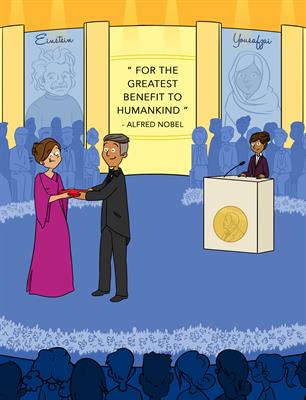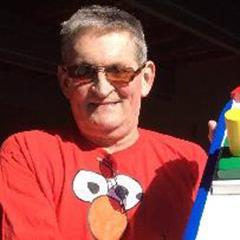
The Nobel collection, Volume 1
Collection Editors
Robert Knight, Idan SegevViews
1,011,926 viewsParticipating Sections
Submission Deadline
Closed
Articles

Astronomy and Physics
01/11/2022
Distant Planets and Big Promises: How to Detect...
Authors
Michel Mayor
Human Health
01/11/2022
Aids: Facts, Fiction, and Future
Authors
Françoise Barré-Sinoussi
Neuroscience and Psychology
01/11/2022
Sparks in the Brain: The Story of Ion Channels...
Authors
Bert Sakmann
Mathematics and Economics
01/11/2022
Human Riddles in Behavioral Economics
Authors
Daniel Kahneman
Astronomy and Physics
01/11/2022
Gravitational Waves—A New Window on the Universe
Authors
Barry Barish
Chemistry and Materials
07/09/2021
Computer Simulations in Service of Biology
Authors
Michael Levitt
Chemistry and Materials
07/09/2021
Quasi-Crystal, Not Quasi-Scientist
Authors
Dan Shechtman
Human Health
07/09/2021
Targeted Degradation of Proteins — The Ubiquitin...
Authors
Aaron Ciechanover
Neuroscience and Psychology
07/09/2021
How Do We Find Our Way? Grid Cells in the Brain
Authors
May-Britt Moser
Human Health
07/09/2021
The Transcription of Life: From DNA to RNA
Authors
Roger D. KornbergAbout this collection
The e-book was translated into Hebrew which you can download here.Humans are highly curious – we are eager to understand ourselves and the world around us, and we love the feeling of discovering something new. Some people choose to become scientists and devote their lives to exploring and understanding the laws of nature and life itself. A scientific understanding of the natural world is critical for developing new technologies and materials, and for curing devastating diseases. Every scientist makes discoveries that contribute to the constantly expanding body of human knowledge. Occasionally, scientists even discover entirely new phenomena that transform the way we understand the universe! Think of Albert Einstein’s famous theories, for example, or the pioneering work of Marie Skłodowska Curie, which led to the discovery of new elements and advanced the treatment of certain cancers. Indeed, her discovery of radioactivity paved the way for both the diagnosis via X-rays, and treatment of cancer via radiation therapy. Groundbreaking discoveries such as these usually result from a combination of knowledge, dedication, brilliance, and good luck. Each year, we celebrate these transformative discoveries by awarding Nobel Prizes in chemistry, physics, economics, and physiology or medicine. These prizes represent our highest-level recognition of the scientific accomplishments that have changed the world for the better.
Now, in 2021 – exactly 120 years after the first Nobel Prize was awarded – we launch this special Nobel Collection in Frontiers for Young Minds. This Collection brings you articles by Nobel laureates, written specifically for young minds. In this first-of-its-kind collection, Nobel Prize winners explain their amazing discoveries and describe how they accomplished them. These Nobel laureates share their thoughts on research and what it means to be a scientist, and they even provide advice for becoming a successful researcher and living a happy, meaningful life. Like all Frontiers for Young Minds articles, these articles have been reviewed and approved by kids like you!
Did you know that Nobel Prize winners and Young Minds readers have several important traits in common? The first is curiosity. The scientific journeys of Nobel laureates are often fueled by an intense, child-like curiosity – the same curiosity that motivates you to read these articles. Many Nobel laureates also manage to stay as open-minded as Young Minds readers – they keep their opinions flexible and can be persuaded to change their minds when new data challenges their existing beliefs. In the words of 2014 Nobel laureate May-Britt Moser, “I believe that it is important to maintain your curiosity about things, both now and as an adult, and find something that you have a passion for, that makes you enthusiastic and feel alive. For myself, I can say that I am very curious about things and that it is extremely important for me to understand things. It gives me so much pleasure when I understand something that I did not understand before - this is my leading star.” We hope that this unique new Collection will be your leading star – that it will help you to further develop your own curiosity and openness, and that it inspires you reach for new discoveries in your own life!
Would you like to submit to this collection?
For researchers interested in submitting to this Collection, please consult our author guidelines and check that you have all the essentials included before submitting








